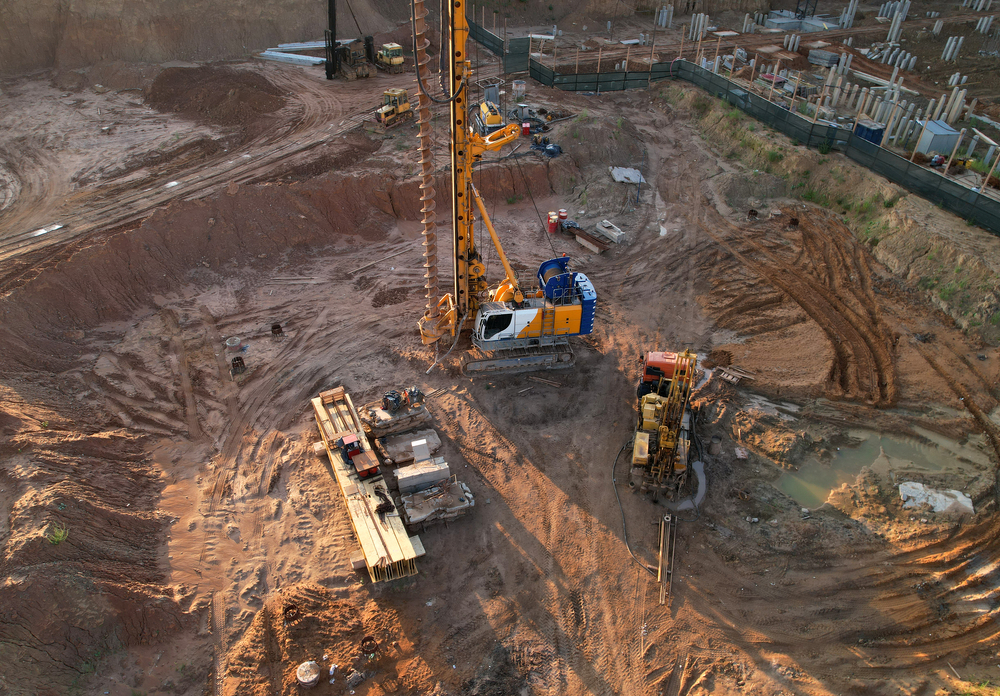Some Known Details About Geotheta
Some Known Details About Geotheta
Blog Article
How Geotheta can Save You Time, Stress, and Money.
Table of ContentsGeotheta Fundamentals ExplainedNot known Facts About GeothetaGeotheta - TruthsThings about Geotheta
They work together with civil designers, structural engineers, engineers, and other professionals to incorporate geotechnical considerations into the overall task style and construction process. This calls for effective synergy, control, and communication to guarantee that the geotechnical aspects straighten with the job objectives and meet governing demands.Mining & Materials Design: Principles of exploration, infiltration prices, and aspects impacting the option of drilling technique. Attributes of nitroglycerins, firing systems and blast patterns. Blowing up methods in surface area and underground operations. Special blasting techniques at excavation boundaries. Resonance and noise control. Mechanical and continuous techniques to fragmentation, including longwall shearing and fullface boring.
Integrated analysis of fragmentation and comminution procedures. Provided by: Mining & Materials Design.
Geotheta Things To Know Before You Buy
Bachelor's degree programs in civil, geotechnical, geological, and environmental engineering usually last 4 years and include basic education courses in English, social science, and the liberal arts, along with training courses in sophisticated mathematics, structural geology, and fluid mineralogy. (https://www.find-us-here.com/businesses/Geotheta-Alexandria-Alabama-USA/34113488/)
Geotechnical engineering includes the analysis of the soil and rock conditions at a certain website, and their implications for the growth of that site. As the majority of frameworks count on the ground for assistance, it is without surprise that an in-depth understanding of the ground problems, and the viability of foundation systems, are crucial to the long-term stability and performance of the building or structure.
Being experts in the examination of geological developments and ground practices, geotechnical designers perform scientific investigations and testing to recognize the impact these geological formations may have on the style and building and construction of structure, civil and infrastructure projects. This expertise is critical for the layout and construction of buildings, roads, tunnels, dams, bridges, and supply of water and sewer system.
The geotechnical team at Douglas Partners routinely talk to architects, design designers, programmers, and contractors to make recommendations on layout and growth proposals to make sure that the built frameworks are suitably made for the ground problems. The design of footing systems needs to consider the weight of the structure, the ability of the ground to support that weight together with activity tolerances and reliable building and construction.
Some Known Facts About Geotheta.
This task is substantially simplified by the use our Douglas Map geospatial platform that makes this information conveniently easily accessible in an easy to utilize web browser user interface. A geotechnical designer will certainly route the exploration of boreholes and test pits to gather soil and various other examples, and also analyze surface functions and ground exposures to develop a geotechnical version of the subsurface conditions.
Relying on the task type and ground conditions encountered, lab screening might amongst various other points evaluate strength, compressibility, sensitivity and/or permeability of dirt and rock samples. Hereafter data is gathered and looked at, the outcomes are used for a geotechnical model of the site, which is typically presented as areas throughout the website.

A geotechnical investigation by nature can only evaluate the ground problems at the places drilled or dug deep into. All-natural variants in soil and rock conditions can happen throughout a site and between test places. It is as a result great method that the geotechnical designer be retained throughout building of the task to provide on-site verification that the ground problems experienced are regular with the assumptions and recommendations given in the geotechnical examination report.
The Geotheta Statements
Geotechnical designers utilize their comprehensive understanding of soil and rock to assess danger and fix troubles on diverse facilities projectsGeotechnical design is a specialist branch of civil engineering which looks at the behaviour of planet materials and the application of soil and rock mechanics. Geo Tech Engineering. As a geotechnical designer, you will evaluate the physical, mechanical and chemical properties of dirt and rock in order to develop structures, keeping structures and earthworks
Geotechnical design is closely connected to and overlaps with, both engineering geology and ground design - https://www.provenexpert.com/geotheta/. It's feasible to be experts in geotechnics or help a geotechnical firm yet be recognized as an engineering geologist or a ground engineer. As a geotechnical engineer, you'll need to: develop and maintain partnerships with clients and other professionals associated with the site, throughout each projectmaintain security standards on website be mindful of cost effects when you make recommendationsstudy geological maps and airborne photographs from a variety of sources and from different time periodsexamine construction intends to see exactly how viable they are based upon your understanding of the siteinvestigate dangers or geological hazards for the sitesearch for ecologically sensitive attributes, such as landfill beginning to establish valid and interpretive ground modelsplan area investigationsdrill and analyse examples of bedrock, soil, groundwater and extra materials moved here oversee other specialists on sitesolve technological problems as they develop, such as unforeseen structures at drill sitesmonitor problems throughout and after building to ensure frameworks are stable in the brief and long termadding information gathered on website to your initial researchcreating geotechnical estimations, drawings, and 2 or three-dimensional computer system designs interpreting the datamaking suggestions regarding the suggested use the site

Report this page